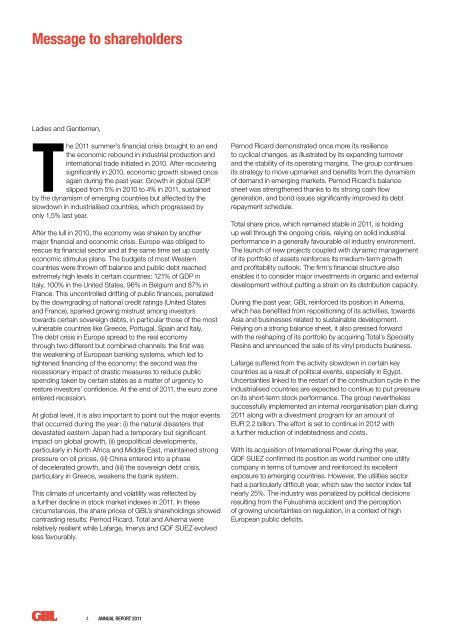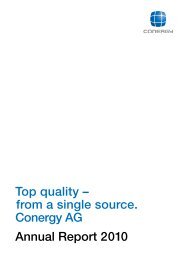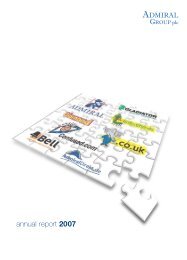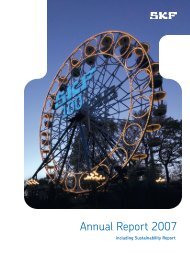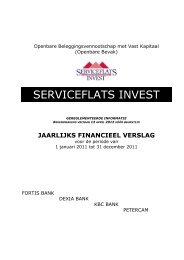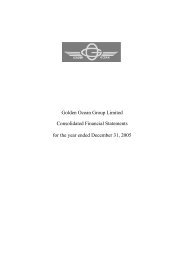Annual Report 2011 - Analist.be
Annual Report 2011 - Analist.be
Annual Report 2011 - Analist.be
Create successful ePaper yourself
Turn your PDF publications into a flip-book with our unique Google optimized e-Paper software.
Message to shareholdersLadies and Gentlemen,The <strong>2011</strong> summer’s financial crisis brought to an endthe economic rebound in industrial production andinternational trade initiated in 2010. After recoveringsignificantly in 2010, economic growth slowed onceagain during the past year. Growth in global GDPslipped from 5% in 2010 to 4% in <strong>2011</strong>, sustainedby the dynamism of emerging countries but affected by theslowdown in industrialised countries, which progressed byonly 1,5% last year.After the lull in 2010, the economy was shaken by anothermajor financial and economic crisis. Europe was obliged torescue its financial sector and at the same time set up costlyeconomic stimulus plans. The budgets of most Westerncountries were thrown off balance and public debt reachedextremely high levels in certain countries: 121% of GDP inItaly, 100% in the United States, 96% in Belgium and 87% inFrance. This uncontrolled drifting of public finances, penalizedby the downgrading of national credit ratings (United Statesand France), sparked growing mistrust among investorstowards certain sovereign debts, in particular those of the mostvulnerable countries like Greece, Portugal, Spain and Italy.The debt crisis in Europe spread to the real economythrough two different but combined channels: the first wasthe weakening of European banking systems, which led totightened financing of the economy; the second was therecessionary impact of drastic measures to reduce publicspending taken by certain states as a matter of urgency torestore investors’ confidence. At the end of <strong>2011</strong>, the euro zoneentered recession.At global level, it is also important to point out the major eventsthat occurred during the year: (i) the natural disasters thatdevastated eastern Japan had a temporary but significantimpact on global growth, (ii) geopolitical developments,particularly in North Africa and Middle East, maintained strongpressure on oil prices, (iii) China entered into a phaseof decelerated growth, and (iiii) the sovereign debt crisis,particulary in Greece, weakens the bank system.This climate of uncertainty and volatility was reflected bya further decline in stock market indexes in <strong>2011</strong>. In thesecircumstances, the share prices of GBL’s shareholdings showedcontrasting results: Pernod Ricard, Total and Arkema wererelatively resilient while Lafarge, Imerys and GDF SUEZ evolvedless favourably.Pernod Ricard demonstrated once more its resilienceto cyclical changes, as illustrated by its expanding turnoverand the stability of its operating margins. The group continuesits strategy to move upmarket and <strong>be</strong>nefits from the dynamismof demand in emerging markets. Pernod Ricard’s balancesheet was strengthened thanks to its strong cash flowgeneration, and bond issues significantly improved its debtrepayment schedule.Total share price, which remained stable in <strong>2011</strong>, is holdingup well through the ongoing crisis, relying on solid industrialperformance in a generally favourable oil industry environment.The launch of new projects coupled with dynamic managementof its portfolio of assets reinforces its medium-term growthand profitability outlook. The firm’s financial structure alsoenables it to consider major investments in organic and externaldevelopment without putting a strain on its distribution capacity.During the past year, GBL reinforced its position in Arkema,which has <strong>be</strong>nefited from repositioning of its activities, towardsAsia and businesses related to sustainable development.Relying on a strong balance sheet, it also pressed forwardwith the reshaping of its portfolio by acquiring Total’s SpecialtyResins and announced the sale of its vinyl products business.Lafarge suffered from the activity slowdown in certain keycountries as a result of political events, especially in Egypt.Uncertainties linked to the restart of the construction cycle in theindustrialised countries are expected to continue to put pressureon its short-term stock performance. The group neverthelesssuccessfully implemented an internal reorganisation plan during<strong>2011</strong> along with a divestment program for an amount ofEUR 2.2 billion. The effort is set to continue in 2012 witha further reduction of indebtedness and costs.With its acquisition of International Power during the year,GDF SUEZ confirmed its position as world num<strong>be</strong>r one utilitycompany in terms of turnover and reinforced its excellentexposure to emerging countries. However, the utilities sectorhad a particularly difficult year, which saw the sector index fallnearly 25%. The industry was penalized by political decisionsresulting from the Fukushima accident and the perceptionof growing uncertainties on regulation, in a context of highEuropean public deficits.4 <strong>Annual</strong> <strong>Report</strong> <strong>2011</strong>


